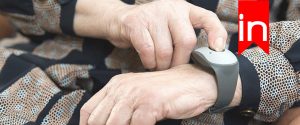When getting a medical alert system from any company, the first thing that consumers should consider is what type of medical alert package they will need to fit their active or not-so-active lifestyle. In the article below, there will be a discussion about what active seniors or what active people should look for and buy when searching for the proper medical system. The main points will be: What are the best rated medical alert systems and what one is the best? What systems does AARP recommend if there are any? Are there any systems covered by Medicare?
What Are the Best Medical Alert Systems for Seniors on the Go?
Starting from great to excellent, the products listed from each company below are specifically the packages that include features that are needed in a medical system for an active senior. These main medical alert system features include GPS tracking, fall detection, and preferably two-way communication. Any system that has these main aspects would work, but recommended systems are always a good place to start when looking for one.#3 – Medical Guardian
Medical Guardian has a few options when it comes to medical alert systems for active seniors:- Mobile Guardian – This on-the-go plan comes with a GPS-enabled mobile device and a waterproof pendant or wristband emergency button option. The mobile unit has a speaker for two-way communication to speak to a trained emergency responder at a monitoring center, but for this to function, the emergency button must be pushed within 350 feet of the mobile device, so always keep it on you. With a monthly payment of $49.95 per month and no equipment or activation fees, clients can get this plan. (unfortunately, there is no available fall detection on this plan)
- Active Guardian – Similar to the Mobile Guardian, this system also has WiFi capabilities to help pinpoint your location along with the already enabled GPS tracking. This package comes with a single mobile unit that can only be worn on a pendant (waterproof), and also has optional fall detection if desired for an extra $10 per month. Without fall detection, consumers can get this system for $44.95 per month and no equipment or activation fees.
- Freedom Guardian – This plan is another on-the-go GPS that is all built into a single smartwatch. To call for help, simply press a button on the side and speak to an emergency responder (via two-way communication). The watch can also do tasks such as calendar alerts and other reminders for the wearer of the watch. (with an extra fee of $5 per month) The cost of this plan is a bit more expensive compared to the others since there’s an initial equipment fee of $99 for the watch and then it’s $44.95 per month afterward. (still no activation fee) *no available fall detection on this plan, either
#2 – Medical Alert
Medical Alert has many great products and features that come at a good price, but the main package that they have for more active people and seniors is their GPS/Mobile System. It’s a mobile system that works for on-the-go or at home; comes with a base/mobile unit (has a two-way communication speaker on both units) linked to a cellular device, has GPS tracking, waterproof interchangeable pendant and wristband options, a 36-hour backup battery, and has fall detection capabilities (extra $10 per month). = Starting at $32.04 per month for annual payment method with no activation or equipment fees. Nevertheless, this certain system from Medical Alert is a great choice for active seniors, especially for all of the great equipment and benefits people receive for a nice price.#1 – MobileHelp
MobileHelp is rated as the best provider of their medical alert systems for active seniors. They have two main systems that can be used by active seniors:- MobileHelp Solo – This is a mobile system that needs a cellular connection; it comes with a mobile unit (does have a small two-way speaker for communication) that has GPS tracking and either a waterproof wristband or pendant emergency button. The button must be pushed within 350 feet of the mobile device in order to get a signal through and this plan has available fall detection. In total, it’s $37.95 per month for monitoring services (an extra $10 for fall detection) and there is still no equipment or activation fee.
- MobileHelp Duo – This package has MobileHelp’s at-home system and its mobile system combined into a single buyable system. This ensures protection at home, as well as on-the-go for seniors. In total, this plan is $41.95 per month (an extra $10 for fall detection applied to both the in-home and out-of-home systems) and there is still no activation or equipment fee. (the at-home system comes with a base unit that has two-way communication, and a pendant or wristband emergency button)
Does AARP Recommend Any Medical Alert Systems?
AARP does not recommend any certain medical alert system or company, but they encourage people to research and ask themselves questions about what they need and what they are looking for in order to fit their loved ones or their own lifestyles. AARP wants people to ask questions like: “What features do you want on the system that will match your needs? What equipment works best? How does monitoring work? How much will it cost me? Is it even available where I live?” – questions like those are what people should think about before purchasing a system of any kind.Are There Any Medical Systems Covered by Medicare?
Unfortunately, Medicare and most private insurance companies won’t cover the cost of medical alert systems. But, some companies may offer discounts depending on the medical alert system company that someone is using. Henceforth, with knowing all of this information, people hopefully will begin to purchase medical alerts from medical alert companies more responsibly and pickier because they will know what they are looking for and will know what is best for them or their loved ones.
In The Bulletin
Related Posts

Medical Alert Bracelet For Breast Cancer Patients: Essential Information for Emergencies
Breast cancer survivors often face a range of health concerns following their treatment, and one ...

Medical Alert Watch With No Monthly Fee
Medical alert watches have become increasingly popular among seniors and their caregivers. These devices provide ...

Why Seniors Living At Home Need a Medical Alert System
Seniors living at home need a medical alert system to ensure their safety and security ...

Activities of Daily Living: A Comprehensive Guide to Maintaining Independence
Activities of daily living (ADLs) are the routine tasks that individuals perform every day to ...
Sponge Bath: Bed Bathing Seniors
Sponge baths, also known as bed baths, are a common practice used to clean the ...


